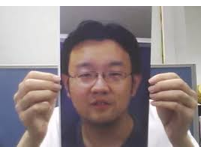
Technology for verifying a person’s identity based on biometric-data is now considered mature enough, and is being increasingly used in industrial applications. However, many biometric verification approaches have also been shown to be very vulnerable to spoofing. In a typical spoof-attack, a person B, claims the identity of an enrolled person A, and presents biometric-data that mimics those A. For example, B may secretly record some speech of A, and may later play back this speech-sample to the automatic speaker verification (ASV) system. A more common example is a spoof-attack on a face-recognition system, where B may attempt to get authenticated as A by holding up a photograph of A to the face-verification (FV) system.
How can the biometric-verification system distinguish between a genuine presentation or an attack-presentation? This is the question tackled in the domain of biometric anti-spoofing, formally called Presentation-Attack Detection (PAD). Biometric verification systems not accompanied by effective PAD systems are quite limited in their scope of application.
(The term presentation refers simply to the act of providing a biometric-sample to the sensor in a biometric-verification system, e.g., presenting one’s fingerprint to a fingerprint-verification system, or speaking into a microphone of an ASV system.)
In the context of TeSLA, besides the ASV instrument, IDIAP is also responsible for providing instruments for face-PAD, and voice-PAD.
Typically, in a spoof-attack on a Face Verification system, the quality of the face-image captured by the camera is poorer than in a genuine presentation. TeSLA’s face-PAD instrument will use a set of well-defined image-quality measures to detect face-presentation-attacks.
Explicit quality measures for speech-data are more difficult to design, than for image-data. The voice-PAD instrument for TeSLA will rely on inter-session-variability (ISV) modelling to detect spoof-attacks on the ASV instrument.
IDIAP – TeSLA project contributor
FUNDED BY THE EUROPEAN UNION
TeSLA is not responsible for any contents linked or referred to from these pages. It does not associate or identify itself with the content of third parties to which it refers via a link. Furthermore TESLA is not liable for any postings or messages published by users of discussion boards, guest books or mailing lists provided on its page. We have no control over the nature, content and availability of any links that may appear on our site. The inclusion of any links does not necessarily imply a recommendation or endorse the views expressed within them.
TeSLA is coordinated by Universitat Oberta de Catalunya (UOC) and funded by the European Commission’s Horizon 2020 ICT Programme. This website reflects the views only of the authors, and the Commission cannot be held responsible for any use which may be made of the information contained therein.